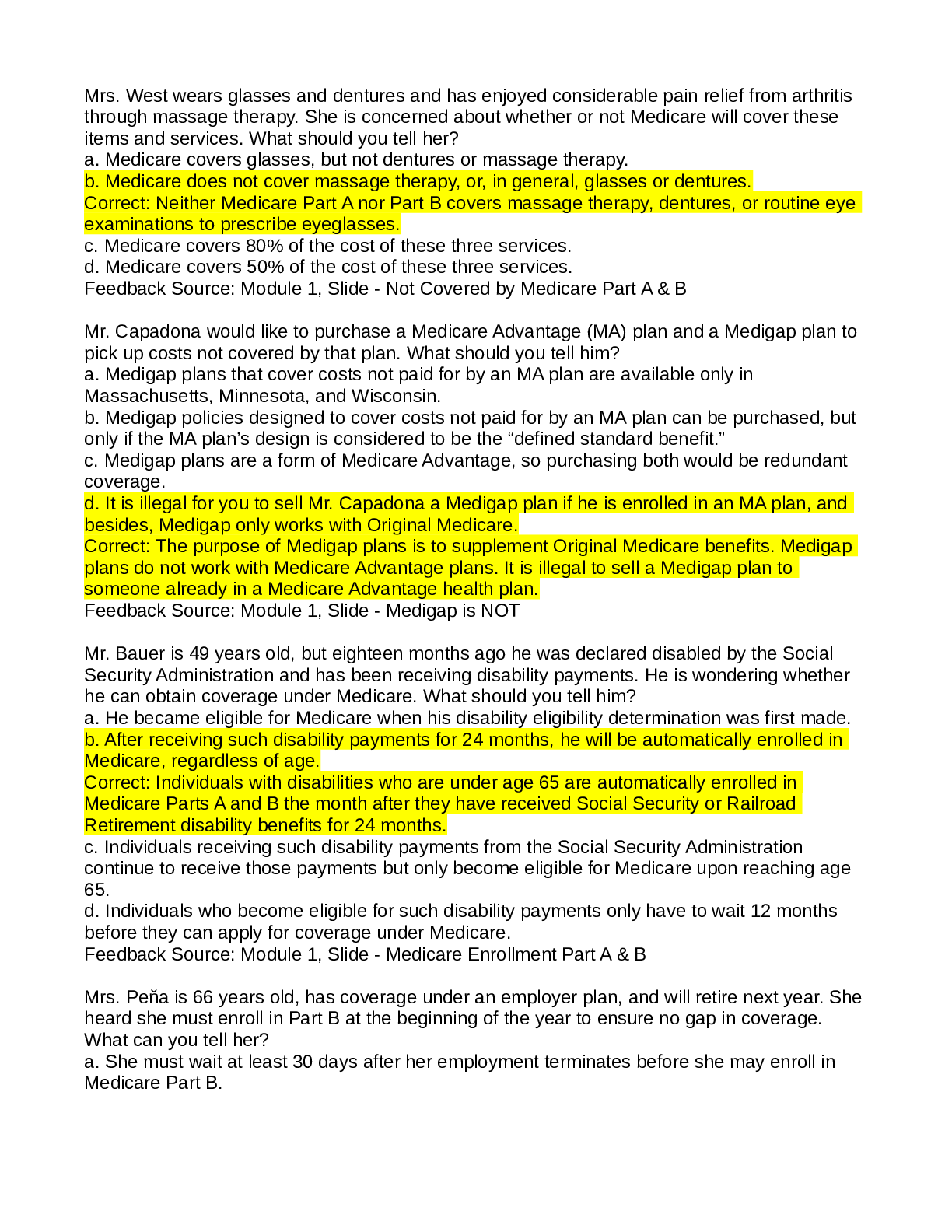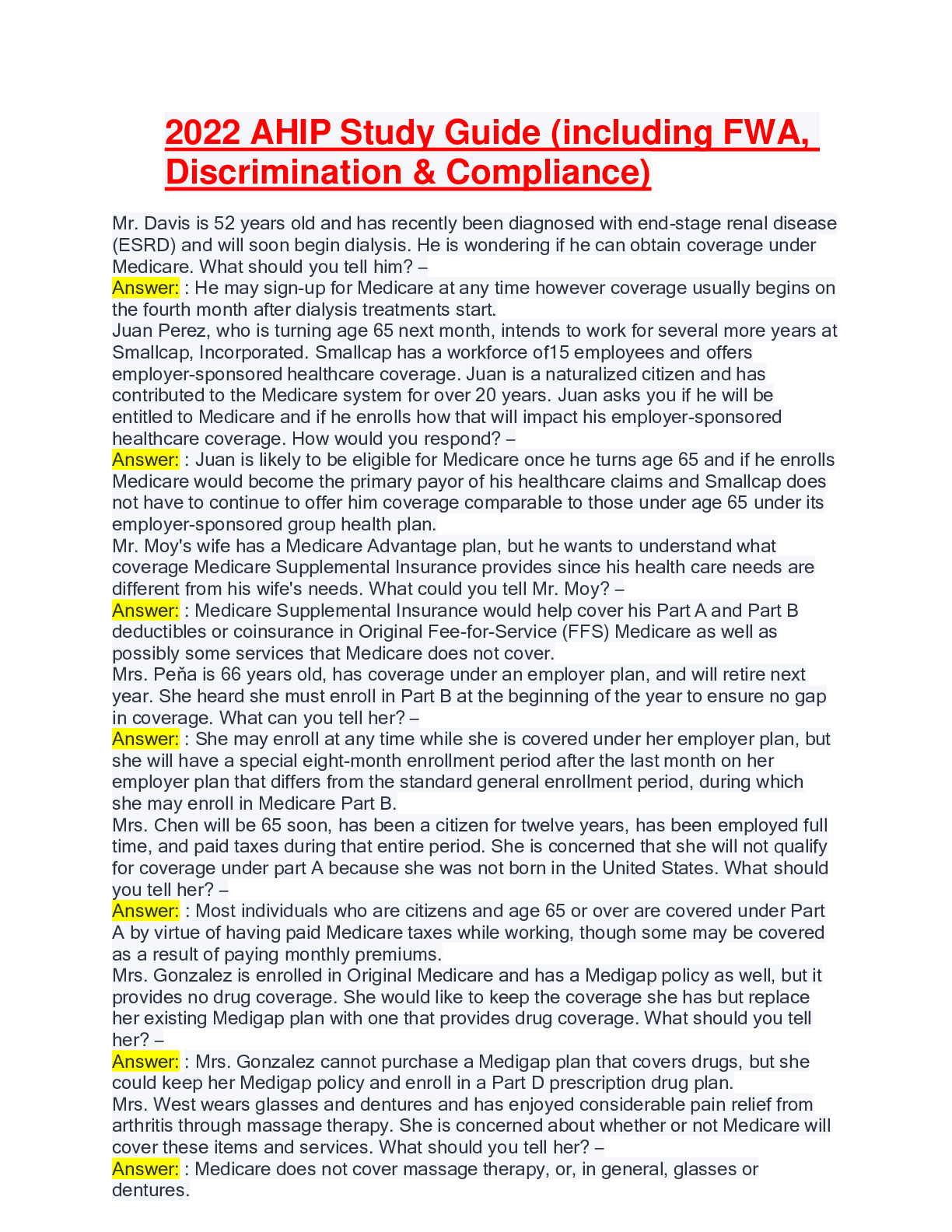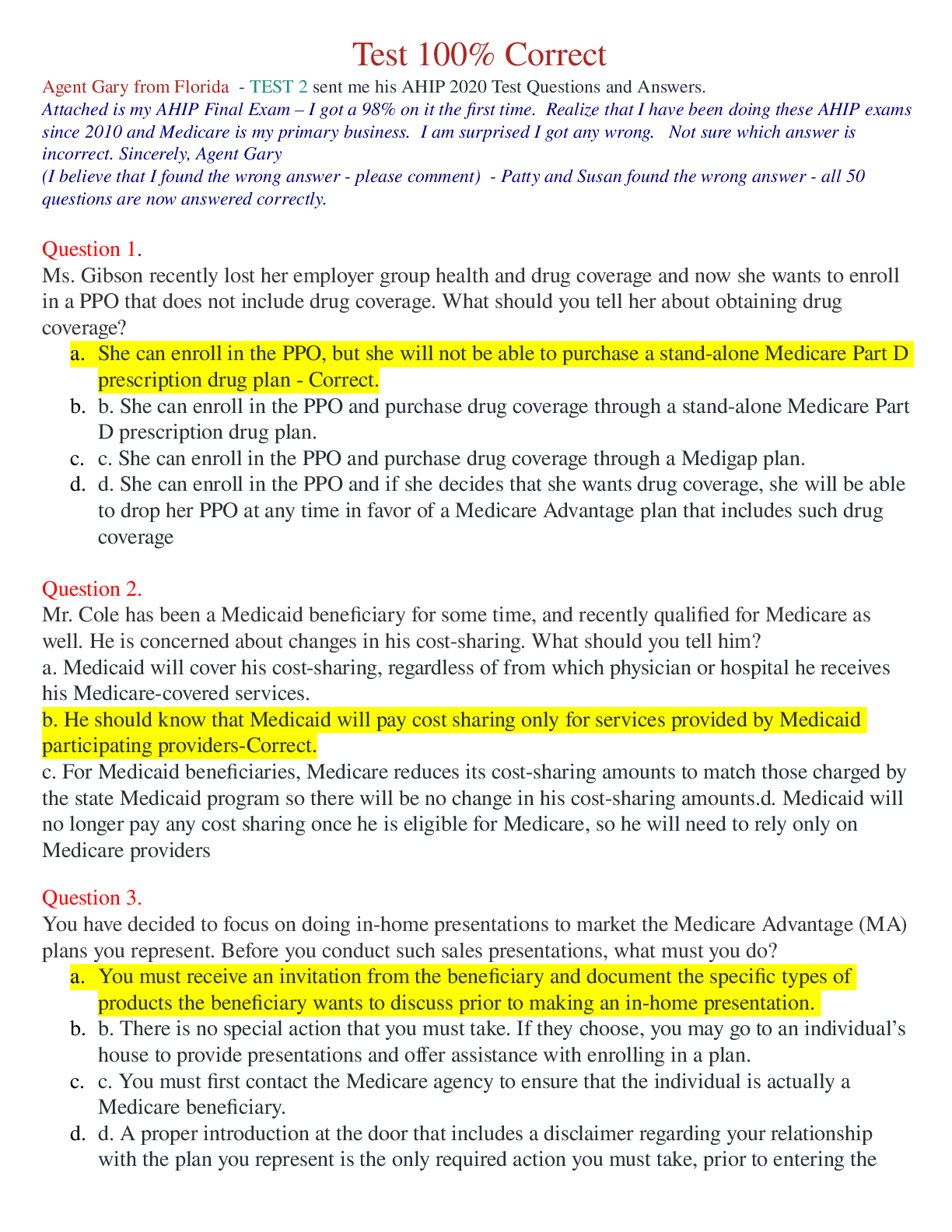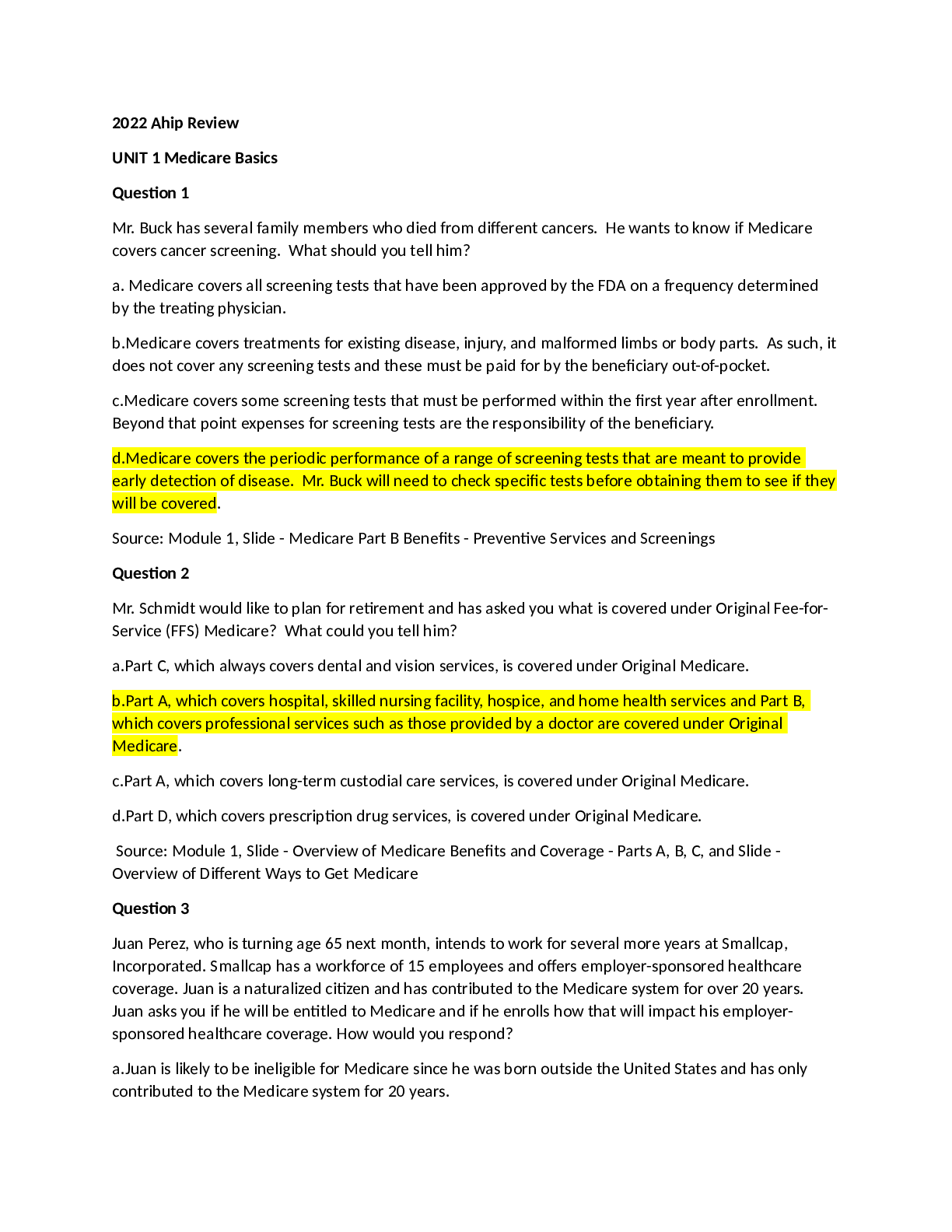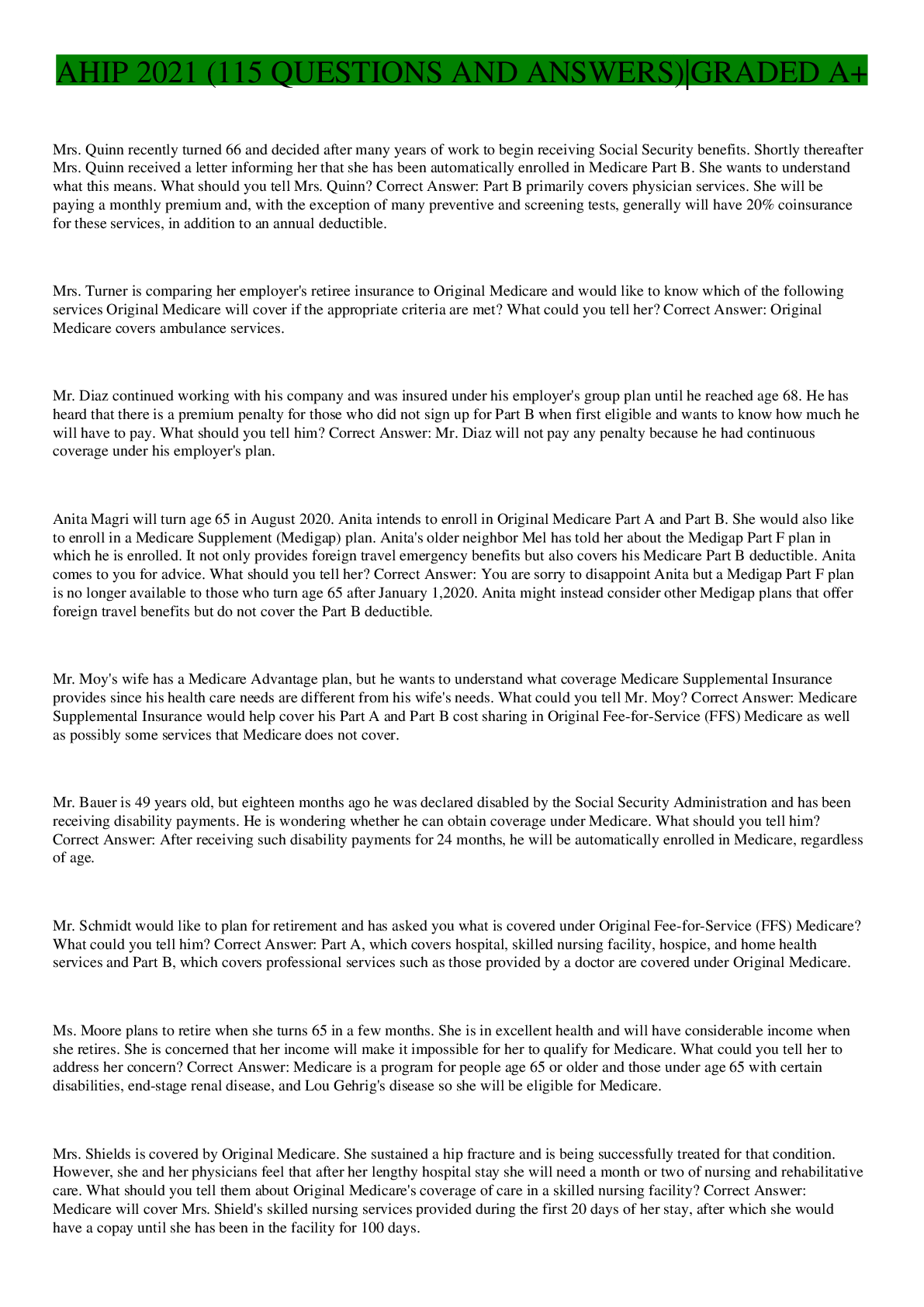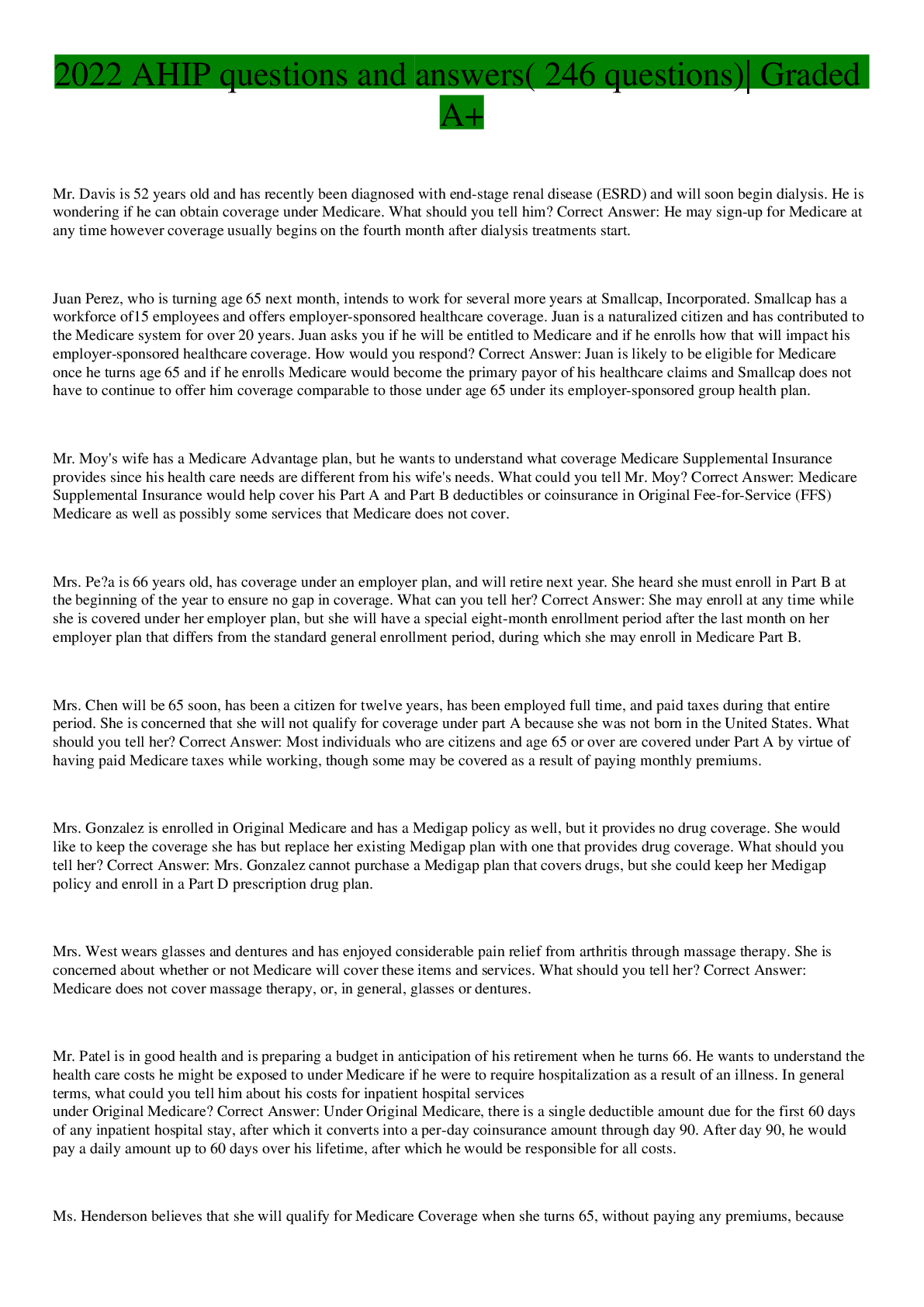AHIP STUDY GUIDE 2022/ 2023 MODULE 1 TO 5
Document Content and Description Below
1. Ms. Moore plans to retire when she turns 65 in a few months. She is in excellent health and will have considerable income when she retires. She is concerned that her income will make it impossible ... for her to qualify for Medicare. What could you tell her to address her concern? Medicare is a program for people age 65 or older and those under age 65 with certain disabilities, end-stage renal disease, and Lou Gehrig’s disease so she will be eligible for Medicare. 2. Mrs. Chen will be 65 soon, has been a citizen for twelve years, has been employed full time, and paid taxes during that entire period. She is concerned that she will not qualify for coverage under part A because she was not born in the United States. What should you tell her? Most individuals who are citizens and age 65 or over are covered under Part A by virtue of having paid Medicare taxes while working, though some may be covered as a result of paying monthly premiums. 3. Mr. Patel is in good health and is preparing a budget in anticipation of his retirement when he turns 66. He wants to understand the health care costs he might be exposed to under Medicare if he were to require hospitalization as a result of an illness. In general terms, what could you tell him about his costs for inpatient hospital services under Original Medicare? Under Original Medicare, there is a single deductible amount due for the first 60 days of any inpatient hospital stay, after which it converts into a per-day coinsurance amount through day 90. After day 90, he would pay a daily amount up to 60 days over his lifetime, after which he would be responsible for all costs. 4. Mrs. Park is an elderly retiree. Mrs. Park has a low fixed income. What could you tell Mrs. Park that might be of assistance? She should contact her state Medicaid agency to see if she qualifies for one of several programs that can help with Medicare costs for which she is responsible. 5. Mr. Schmidt would like to plan for retirement and has asked you what is covered under Original Fee-for-Service (FFS) Medicare? What could you tell him? Part A, which covers hospital, skilled nursing facility, hospice, and home health services and Part B, which covers professional services such as those provided by a doctor are covered under Original Medicare. 6. Mrs. West wears glasses and dentures and has enjoyed considerable pain relief from arthritis through massage therapy. She is concerned about whether or not Medicare will -cover these items and services. What should you tell her? Medicare does not cover massage therapy, or, in general, glasses or dentures. 7. Mr. Alonso receives some help paying for his two generic prescription drugs from his employer’s retiree coverage, but he wants to compare it to a Part D prescription drug plan. He asks you what costs he would generally expect to encounter when enrolling into a standard Medicare Part D prescription drug plan. What should you tell him? He generally would pay a monthly premium, annual deductible, and per-prescription cost- sharing. 8. Mrs. Peña is 66 years old, has coverage under an employer plan, and will retire next year. She heard she must enroll in Part B at the beginning of the year to ensure no gap in coverage. What can you tell her? She may enroll at any time while she is covered under her employer plan, but she will have a special eight-month enrollment period after the last month on her employer plan that differs from the standard general enrollment period, during which she may enroll in Medicare Part B. 9. Mrs. Gonzalez is enrolled in Original Medicare and has a Medigap policy as well, but it provides no drug coverage. She would like to keep the coverage she has but replace her existing Medigap plan with one that provides drug coverage. What should you tell her? Mrs. Gonzalez cannot purchase a Medigap plan that covers drugs, but she could keep her Medigap policy and enroll in a Part D prescription drug plan. 10. Mr. Davis is 52 years old and has recently been diagnosed with end-stage renal disease (ESRD) and will soon begin dialysis. He is wondering if he can obtain coverage under Medicare. What should you tell him? He may sign-up for Medicare at any time however coverage usually begins on the fourth month after dialysis treatments start. 11. Ms. Henderson believes that she will qualify for Medicare Coverage when she turns 65, without paying any premiums, because she has been working for 40 years and paying Medicare taxes. What should you tell her? To obtain Part B coverage, she must pay a standard monthly premium, though it is higher for individuals with higher incomes. 12. Mr. Capadona would like to purchase a Medicare Advantage (MA) plan and a Medigap plan to pick up costs not covered by that plan. What should you tell him? It is illegal for you to sell Mr. Capadona a Medigap plan if he is enrolled in an MA plan, and besides, Medigap only works with Original Medicare. 13. Mr. Rainey is experiencing paranoid delusions and his physician feels that he should be hospitalized. What should you tell Mr. Rainey (or his representative) about the length of an inpatient psychiatric hospital stay that Medicare will cover? Medicare will cover a total of 190 days of inpatient psychiatric care during Mr. Rainey’s entire lifetime. 14. Mr. Moy's wife has a Medicare Advantage plan, but he wants to understand what coverage Medicare Supplemental Insurance provides since his health care needs are different from his wife’s needs. What could you tell Mr. Moy? Medicare Supplemental Insurance would help cover his Part A and Part B deductibles or coinsurance in Original Fee-for-Service (FFS) Medicare as well as possibly some services that Medicare does not cover. 15. Mr. Buck has several family members who died from different cancers. He wants to know if Medicare covers cancer screening. What should you tell him? Medicare covers the periodic performance of a range of screening tests that are meant to provide early detection of disease. Mr. Buck will need to check specific tests before obtaining them to see if they will be covered. 16. Mr. Bauer is 49 years old, but eighteen months ago he was declared disabled by the Social Security Administration and has been receiving disability payments. He is wondering whether he can obtain coverage under Medicare. What should you tell him? After receiving such disability payments for 24 months, he will be automatically enrolled in Medicare, regardless of age. 17. Mr. Xi will soon turn age 65 and has come to you for advice as to what services are provided under Original Medicare. What should you tell Mr. Xi that best describes the health coverage provided to Medicare beneficiaries? Beneficiaries under Original Medicare have no cost-sharing for most preventive services which include immunizations such as annual flu shots. 18. Juan Perez, who is turning age 65 next month, intends to work for several more years at Smallcap, Incorporated. Smallcap has a workforce of 15 employees and offers employer- sponsored healthcare coverage. Juan is a naturalized citizen and has contributed to the Medicare system for over 20 years. Juan asks you if he will be entitled to Medicare and if he enrolls how that will impact his employer-sponsored healthcare coverage. How would you respond? Juan is likely to be eligible for Medicare once he turns age 65 and if he enrolls Medicare would become the primary payor of his healthcare claims and Smallcap does not have to continue to offer him coverage comparable to those under age 65 under its employer-sponsored group health plan. 19. Agent John Miller is meeting with Jerry Smith, a new prospect. Jerry is currently enrolled in Medicare Parts A and B. Jerry has also purchased a Medicare Supplement (Medigap) plan which he has had for several years. However, the plan does not provide drug benefits. How would you advise Agent John Miller to proceed? Tell prospect Jerry Smith that he should consider adding a standalone Part D prescription drug coverage policy to his present coverage. 20. Mrs. Duarte is enrolled in Original Medicare Parts A and B. She has recently reviewed her Medicare Summary Notice (MSN) and disagrees with a determination that partially denied one of her claims for services. What advice would you give her? Mrs. Duarte should file an appeal of this initial determination within 120 days of the date she received the MSN in the mail. Module 2 1. Mr. Wells is trying to understand the difference between Original Medicare and Medicare Advantage. What would be the correct description? Medicare Advantage is a way of covering all the Original Medicare benefits through private health insurance companies. 2. Mrs. Andrews asked how a Private Fee-for-Service (PFFS) plan might affect her access to services since she receives some assistance for her health care costs from the State. What should you tell her? Medicaid may provide additional benefits, but Medicaid will coordinate benefits only with Medicaid participating providers. 3. Mr. Romero is 64, retiring soon, and considering enrollment in his employer-sponsored retiree group health plan that includes drug coverage with nominal copays. He heard about a neighbor’s MA-PD plan that you represent and because he takes numerous prescription drugs, he is considering signing up for it. What should you tell him? He should compare the benefits in his employer-sponsored retiree group health plan with the benefits in his neighbor’s MA-PD plan to determine which one will provide sufficient coverage for his prescription needs. 4. Mr. Kumar is considering a Medicare Advantage HMO and has questions about his ability to access providers. What should you tell him? In most Medicare Advantage HMOs, Mr. Kumar must generally obtain his services only from providers within the plan's network (except in an emergency or where care is unavailable within the network). 5. Daniel is a middle-income Medicare beneficiary. He has chronic bronchitis, putting him at severe risk for pneumonia. Otherwise, he has no problems functioning. Which type of SNP is likely to be most appropriate for him? C-SNP 6. Which of the following statement is/are correct about a Medicare Savings Account (MSA) Plans? I. MSAs may have either a partial network, full network, or no network of providers. II. MSA plans cover Part A and Part B benefits but not Part D prescription drug benefits. III. An individual who is enrolled in an MSA plan is responsible for a minimal deductible of $500 indexed for inflation. IV. Non-network providers must accept the same amount that Original Medicare would pay them as payment in full. I, II, and IV only 7. Mr. Greco is in excellent health, lives in his own home, and has a sizeable income from his investments. He has a friend enrolled in a Medicare Advantage Special Needs Plan (SNP). His friend has mentioned that the SNP charges very low cost-sharing amounts and Mr. Greco would like to join that plan. What should you tell him? SNPs limit enrollment to certain subpopulations of beneficiaries. Given his current situation, he is unlikely to qualify and would not be able to enroll in the SNP. 8. Mrs. Radford asks whether there are any special eligibility requirements for Medicare Advantage. What should you tell her? Mrs. Radford must be entitled to Part A and enrolled in Part B to enroll in Medicare Advantage. 9. Mr. Lombardi is interested in a Medicare Advantage (MA) PPO plan that you represent. It is one of three plans operated by the same organization in Mr. Lombardi’s area. The MA PPO plan does not include drug coverage, but the other two plans do. Mr. Lombardi likes the PPO plan that does not include drug coverage and intends to obtain his drug coverage through a stand- alone Medicare prescription drug plan. What should you tell him about this situation? He could enroll either in one of the MA plans that include prescription drug coverage or Original Medicare with a Medigap plan and standalone Part D prescription drug coverage, but he cannot enroll in the MA-only PPO plan and a stand-alone prescription drug plan. 10. Mrs. Ramos is considering a Medicare Advantage PPO and has questions about which providers she can go to for her health care. What should you tell her? Mrs. Ramos can obtain care from any provider who participates in Original Medicare, but generally will have a higher cost-sharing amount if she sees a provider who/that is not a part of the PPO network. 11. Mrs. Davenport enrolled in the ABC Medicare Advantage (MA) plan several years ago. In mid- February of 2021, her doctor confirms a diagnosis of end-stage renal disease (ESRD). What options will Mrs. Davenport have regarding her MA plan during the next open enrollment season? She may remain in her ABC MA plan, enroll in another MA plan in her service area, or enroll in a Special Needs Plan (SNP) for individuals suffering from ESRD if one is available in her area. 12. Mr. Lopez has heard that he can sign up for a product called “Medicare Advantage” but is not sure about what type of plan designs are available through this program. What should you tell him about the types of health plans that are available through the Medicare Advantage program? They are Medicare health plans such as HMOs, PPOs, PFFS, and MSAs. 13. Mr. Castillo, a naturalized citizen, previously enrolled in Medicare Part B but has recently stopped paying his Part B premium. Mr. Castillo is still covered by Part A. He would like to enroll in a Medicare Advantage (MA) plan and is still covered by Part A. What should you tell him? He is not eligible to enroll in a Medicare Advantage plan until he re-enrolls in Medicare Part B. 14. Dr. Elizabeth Brennan does not contract with the ABC PFFS plan but accepts the plan’s terms and conditions for payment. Mary Rodgers sees Dr. Brennan for treatment. How much may Dr. Brennan charge? Dr. Brennan can charge Mary Rogers no more than the cost sharing specified in the PFFS plan’s terms and condition of payment which may include balance billing up to 15% of the Medicare rate. 15. Mr. Gomez notes that a Private Fee-for-Service (PFFS) plan available in his area has an attractive premium. He wants to know if he must use doctors in a network as his current HMO plan requires him to do. What should you tell him? He may receive health care services from any doctor allowed to bill Medicare, as long as he shows the doctor the plan’s identification card and the doctor agrees to accept the PFFS plan’s payment terms and conditions, which could include balance billing. 16. Mr. Sanchez has just turned 65 and is entitled to Part A but has not enrolled in Part B because he has coverage through an employer plan. If he wants to enroll in a Medicare Advantage plan, what will he have to do? He will have to enroll in Part B. 17. Mr. Barker enjoys a comfortable retirement income. He recently had surgery and expected that he would have certain services and items covered by the plan with minimal out-of-pocket costs because his MA-PD coverage has been very good. However, when he received the bill, he was surprised to see large charges in excess of his maximum out-of-pocket limit that included some services and items he thought would be fully covered. He called you to ask what he could do? What could you tell him? You can offer to review the plans appeal process to help him ask the plan to review the coverage decision. 18. Mrs. Burton is a retiree with substantial income. She is enrolled in an MA-PD plan and was disappointed with the service she received from her primary care physician because she was told she would have to wait five weeks to get an appointment when she was feeling ill. She called you to ask what she could do so she would not have to put up with such poor access to care. What could you tell her? She could file a grievance with her plan to complain about the lack of timeliness in getting an appointment. 19. Mr. Sinclair has diabetes and heart trouble and is generally satisfied with the care he has received under Original Medicare, but he would like to know more about Medicare Advantage Special Needs Plans (SNPs). What could you tell him? SNPs have special programs for enrollees with chronic conditions, like Mr. Sinclair, and they provide prescription drug coverage that could be very helpful as well. 20. Mrs. Chi is age 75 and enjoys a comfortable but not extremely high-income level. She wishes to enroll in a MA MSA plan that she heard about from her neighbor. She also wants to have prescription drug coverage since her doctor recently prescribed several expensive medications. Currently, she is enrolled in Original Medicare and a standalone Part D plan. How would you advise Mrs. Chi? Mrs. Chi may enroll in a MS MSA plan and remain in her current standalone Part D prescription drug plan. Module 3 1. Mr. Zachow has a condition for which three drugs are available. He has tried two but had an allergic reaction to them. Only the third drug works for him and it is not on his Part D plan’s formulary. What could you tell him to do? Mr. Zachow has a right to request a formulary exception to obtain coverage for his Part D drug. He or his physician could obtain the standardized request form on the plan’s website, fill it out, and submit it to his plan. 2. Mrs. Berkowitz wants to enroll in a Medicare Advantage plan that does not include drug coverage and also enroll in a stand-alone Medicare prescription drug plan. Under what circumstances can she do this? If the Medicare Advantage plan is a Private Fee-for-Service (PFFS) plan that does not offer drug coverage or a Medical Savings Account plan, Mrs. Berkowitz can do this. 3. Which of the following statements about Medicare Part D are correct? I. Part D plans must enroll any eligible beneficiary who applies regardless of health status except in limited circumstances. II. Private fee-for-service (PFFS) plans are not required to use a pharmacy network but may choose to have one. III. Beneficiaries enrolled in a MA-Medical Savings Account (MSA) plan may only obtain Part D benefits through a standalone PDP. IV. Beneficiaries enrolled in a MA-PPO may obtain Part D benefits through a standalone PDP or through their plan. I, II, and III only 4. Mrs. Quinn has just turned 65, is in excellent health and has a relatively high income. She uses no medications and sees no reason to spend money on a Medicare prescription drug plan if she does not need the coverage. She currently does not have creditable coverage. What could you tell her about the implications of such a decision? If she does not sign up for a Medicare prescription drug plan as soon as she is eligible to do so, and if she does sign up at a later date, her premium will be permanently increased by 1% of the national average premium for every month that she was not covered. 5. Mr. Hutchinson has drug coverage through his former employer’s retiree plan. He is concerned about the Part D premium penalty if he does not enroll in a Medicare prescription drug plan, but does not want to purchase extra coverage that he will not need. What should you tell him? If the drug coverage he has is not expected to pay, on average, at least as much as Medicare’s standard Part D coverage expects to pay, then he will need to enroll in Medicare Part D during his initial eligibility period to avoid the late enrollment penalty. 6. Mr. Wingate is a newly enrolled Medicare Part D beneficiary and one of your clients. In addition to drugs on his plan’s formulary he takes several other medications. These include a prescription drug not on his plan’s formulary, over-the-counter medications for colds and allergies, vitamins, and drugs from an Internet-based Canadian pharmacy to promote hair growth and reduce joint swelling. His neighbor recently told him about a concept called TrOOP and he asks you if any of his other medications could count toward TrOOP should he ever reach the Part D catastrophic limit. What should you say? None of the costs of Mr. Wingate’s other medications would currently count toward TrOOP but he may wish to ask his plan for an exception to cover the prescription not on its formulary. 7. Mrs. McIntire is enrolled in her state’s Medicaid plan and has just become eligible for Medicare as well. What can she expect will happen to her drug coverage? Unless she chooses a Medicare Part D prescription drug plan on her own, she will be automatically enrolled in one available in her area. 8. Mr. Jacob understands that there is a standard Medicare Part D prescription drug benefit, but when he looks at information on various plans available in his area, he sees a wide range in [Show More]
Last updated: 1 year ago
Preview 1 out of 14 pages
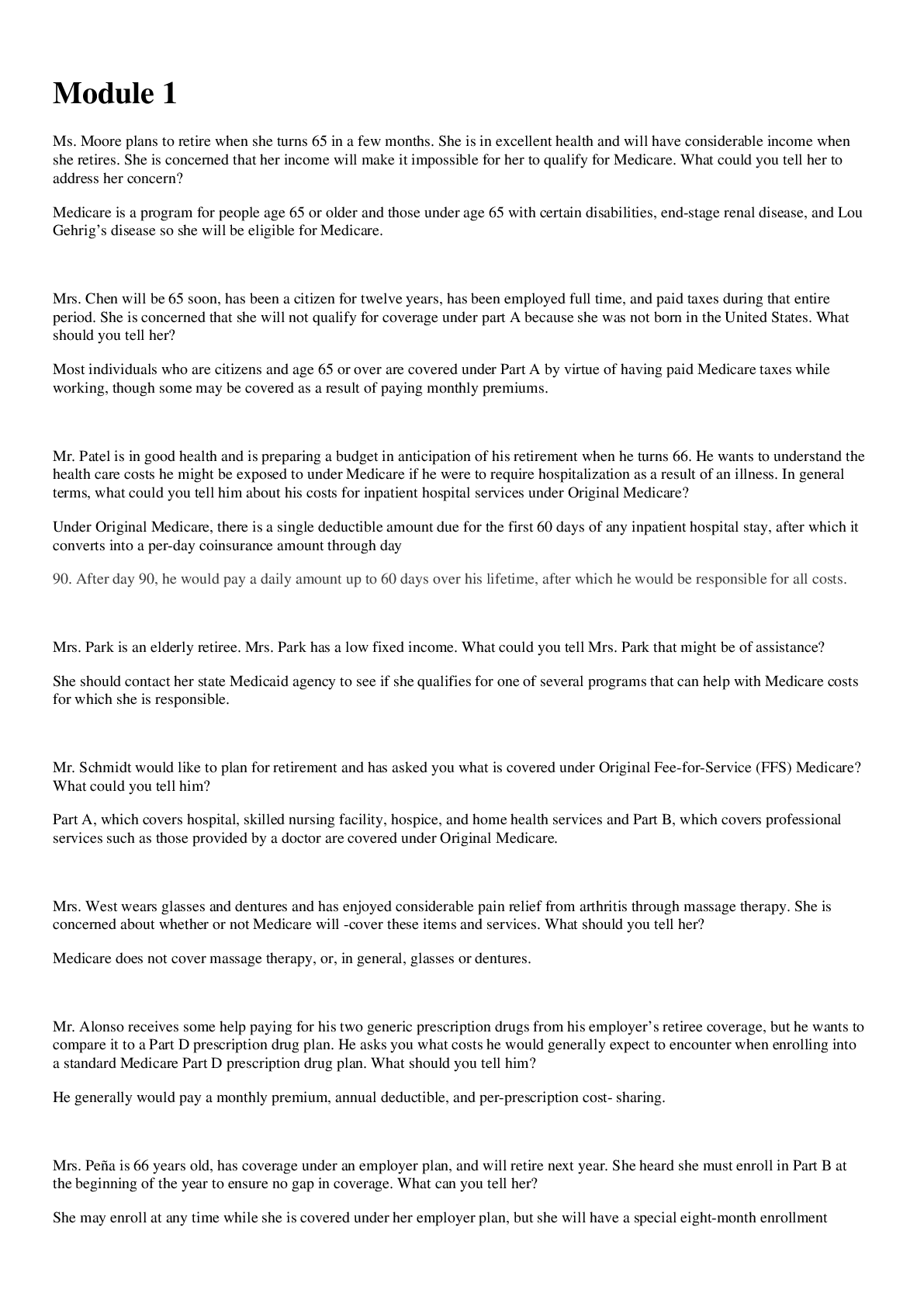
Reviews( 0 )
Document information
Connected school, study & course
About the document
Uploaded On
Aug 14, 2022
Number of pages
14
Written in
Additional information
This document has been written for:
Uploaded
Aug 14, 2022
Downloads
0
Views
102

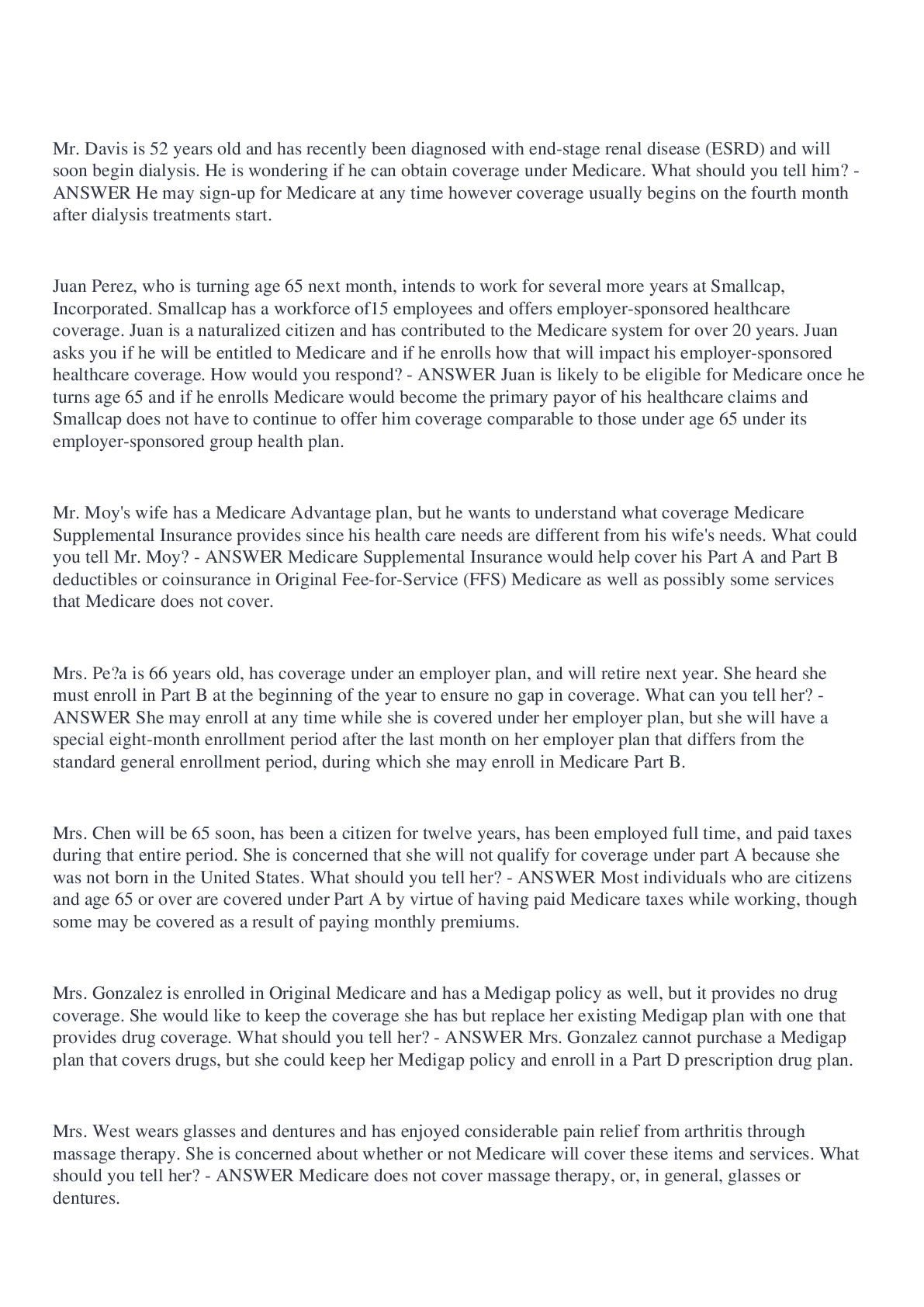
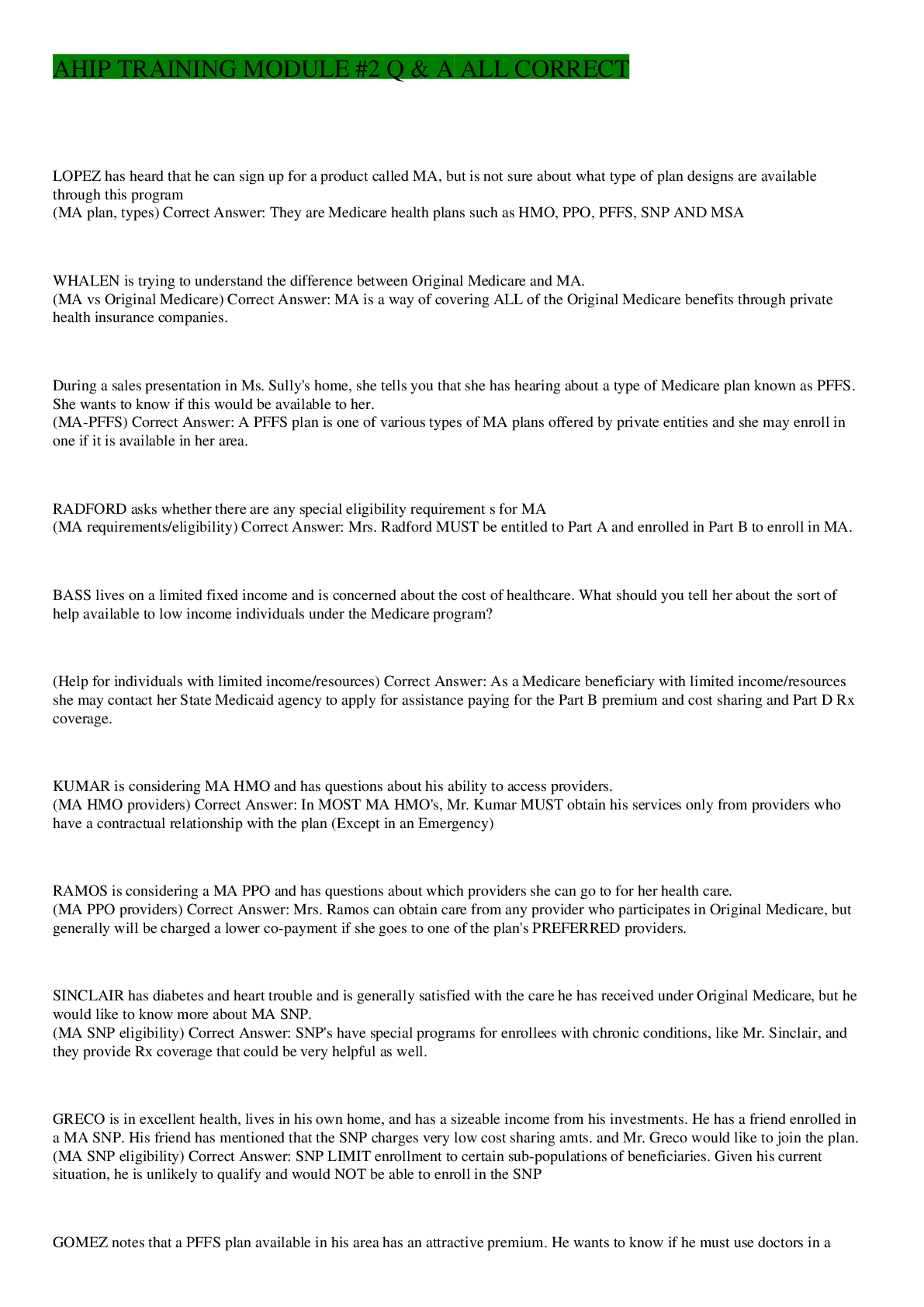
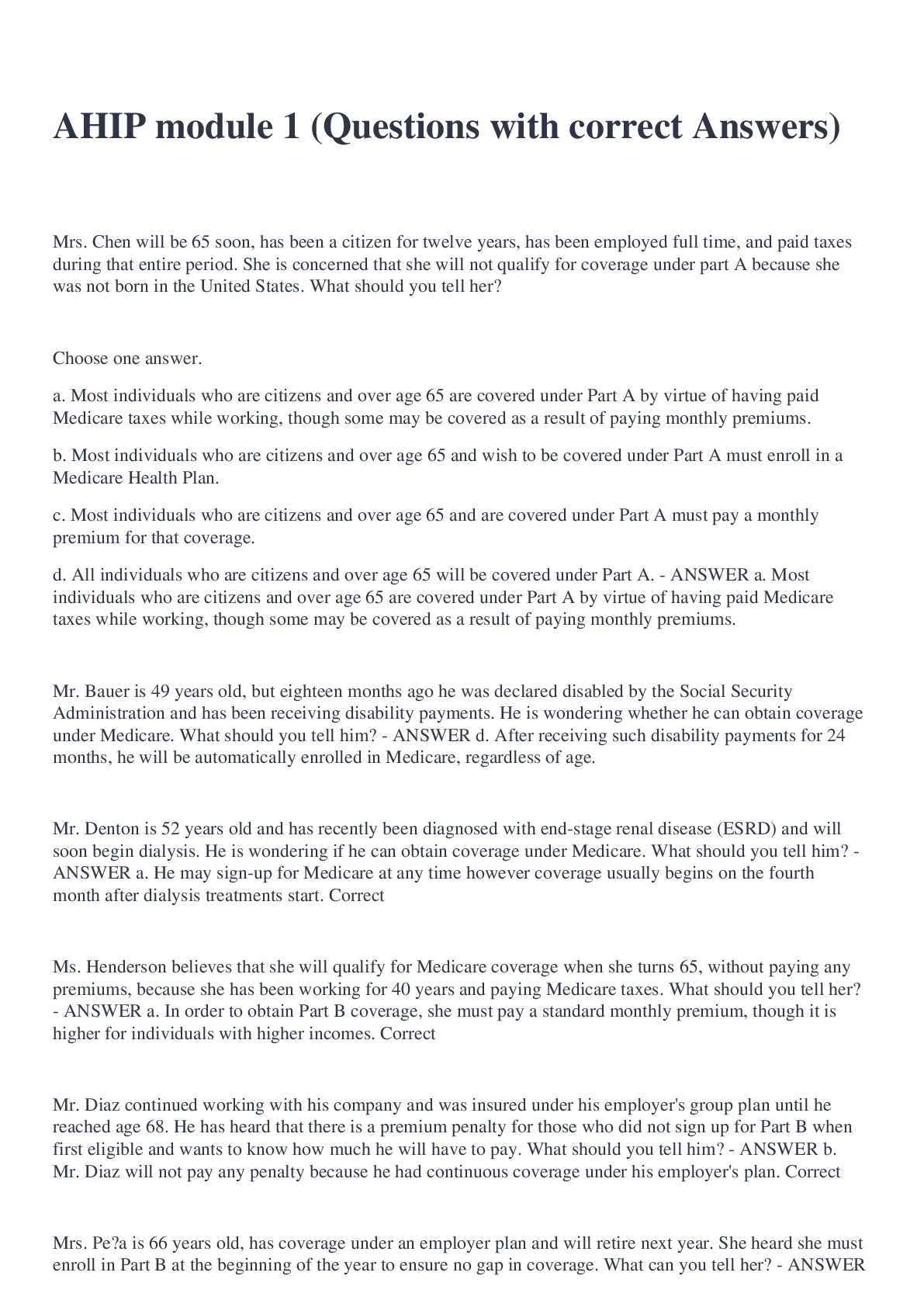
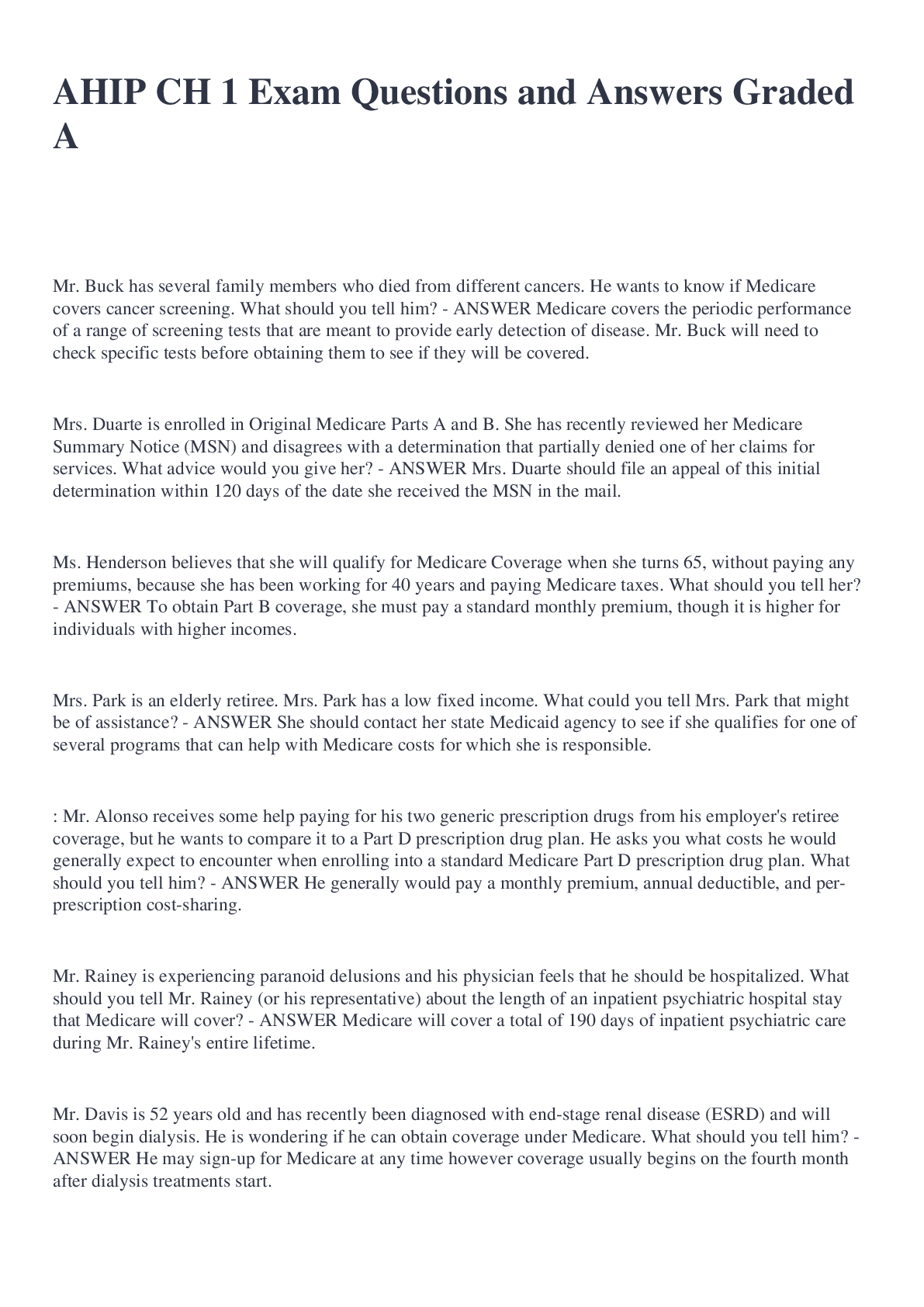
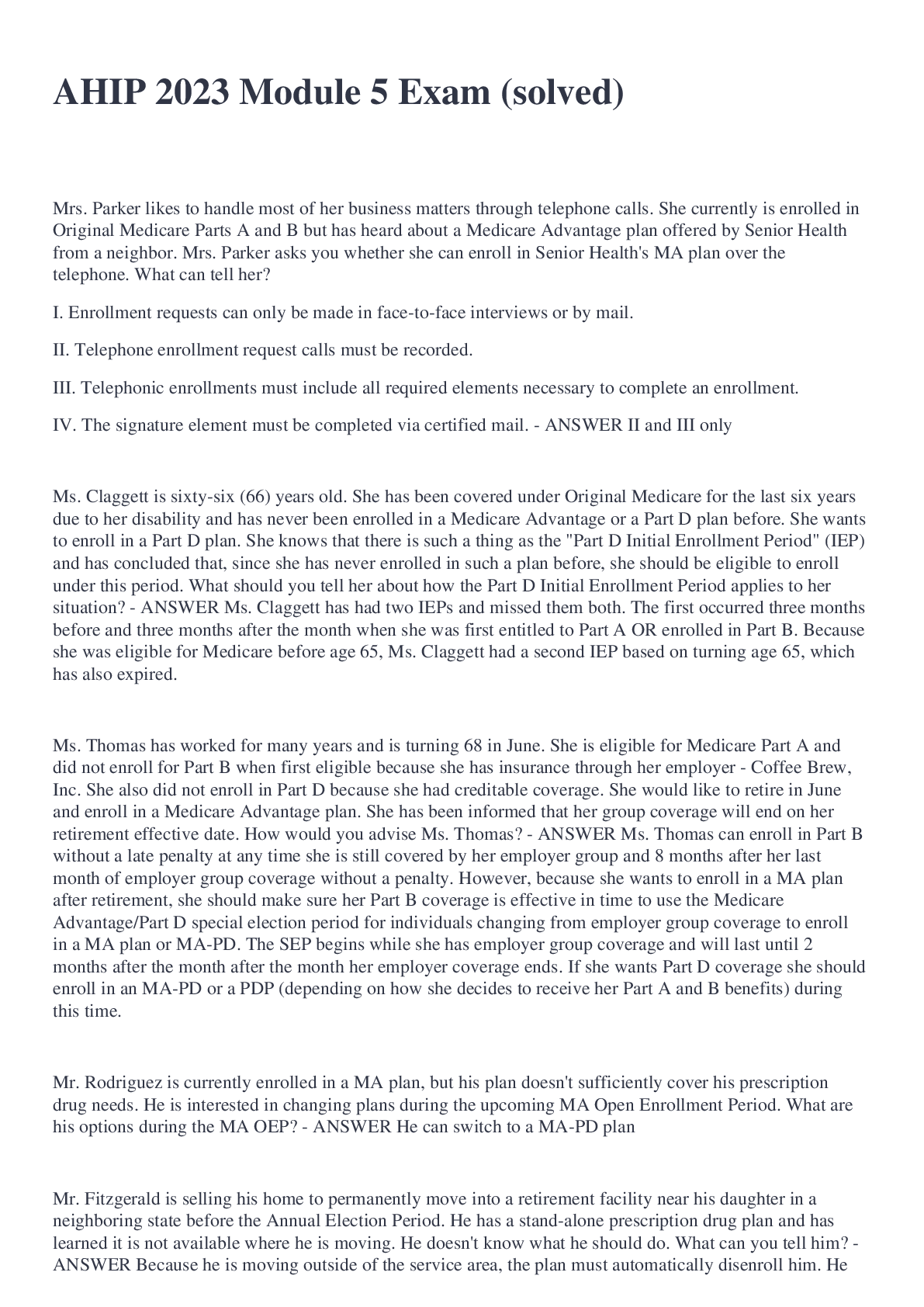
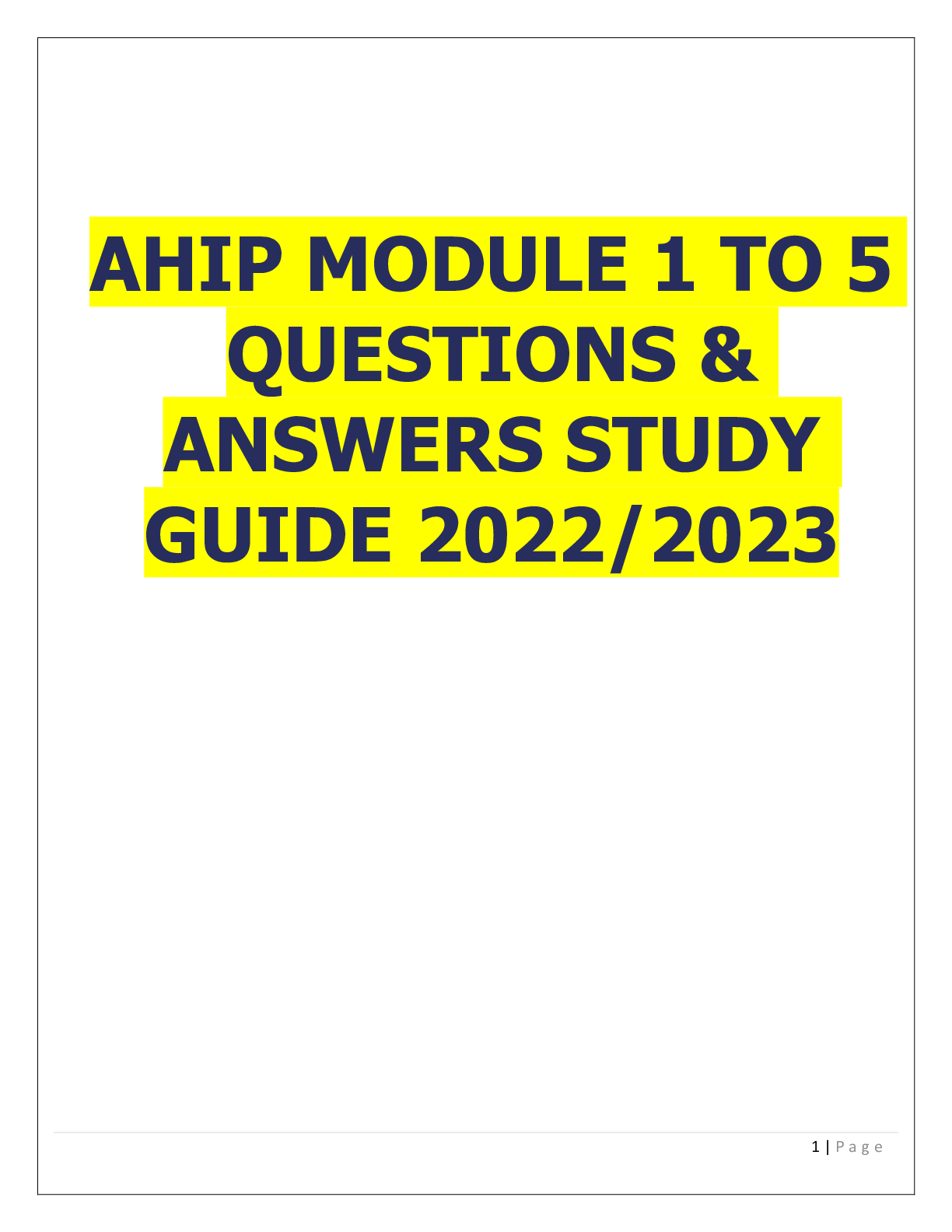
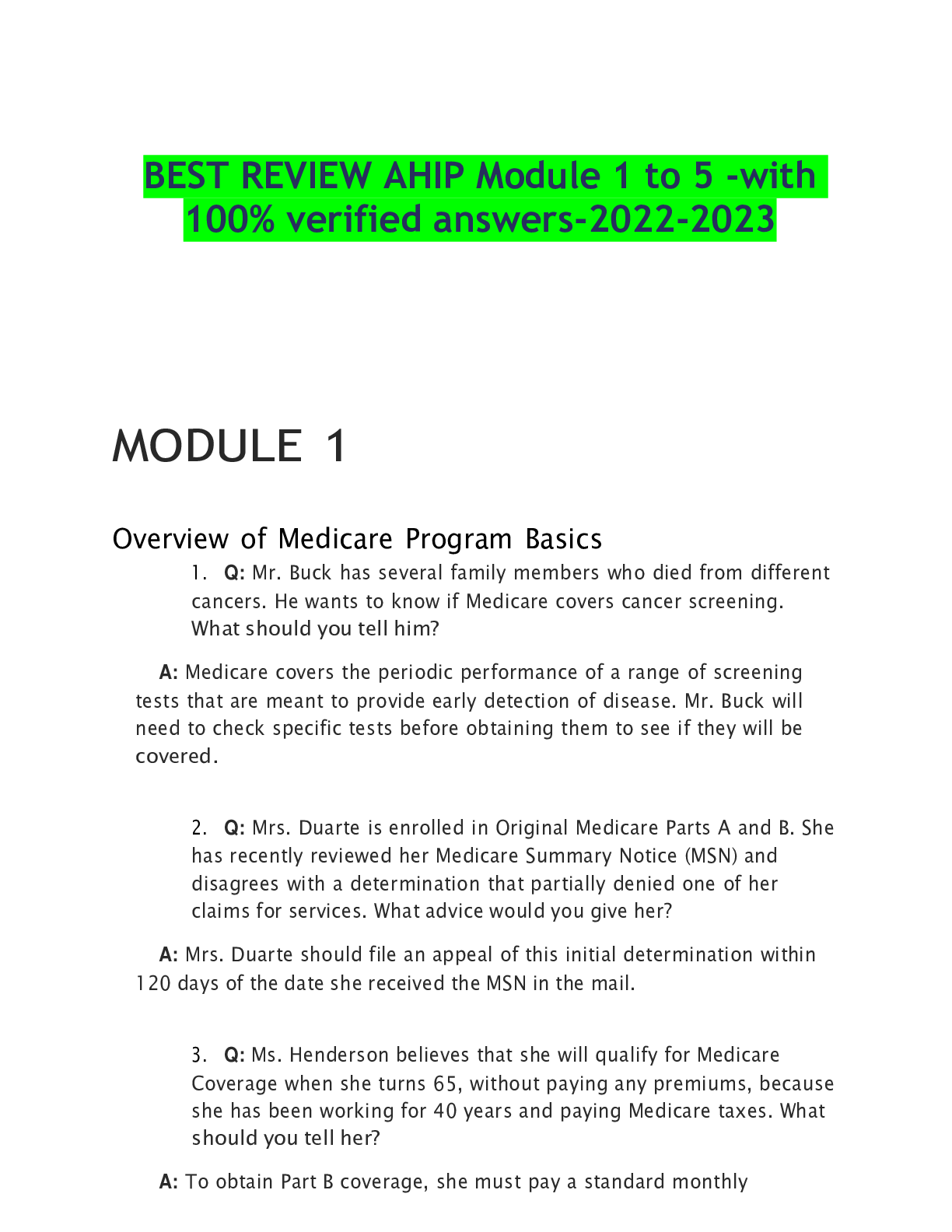
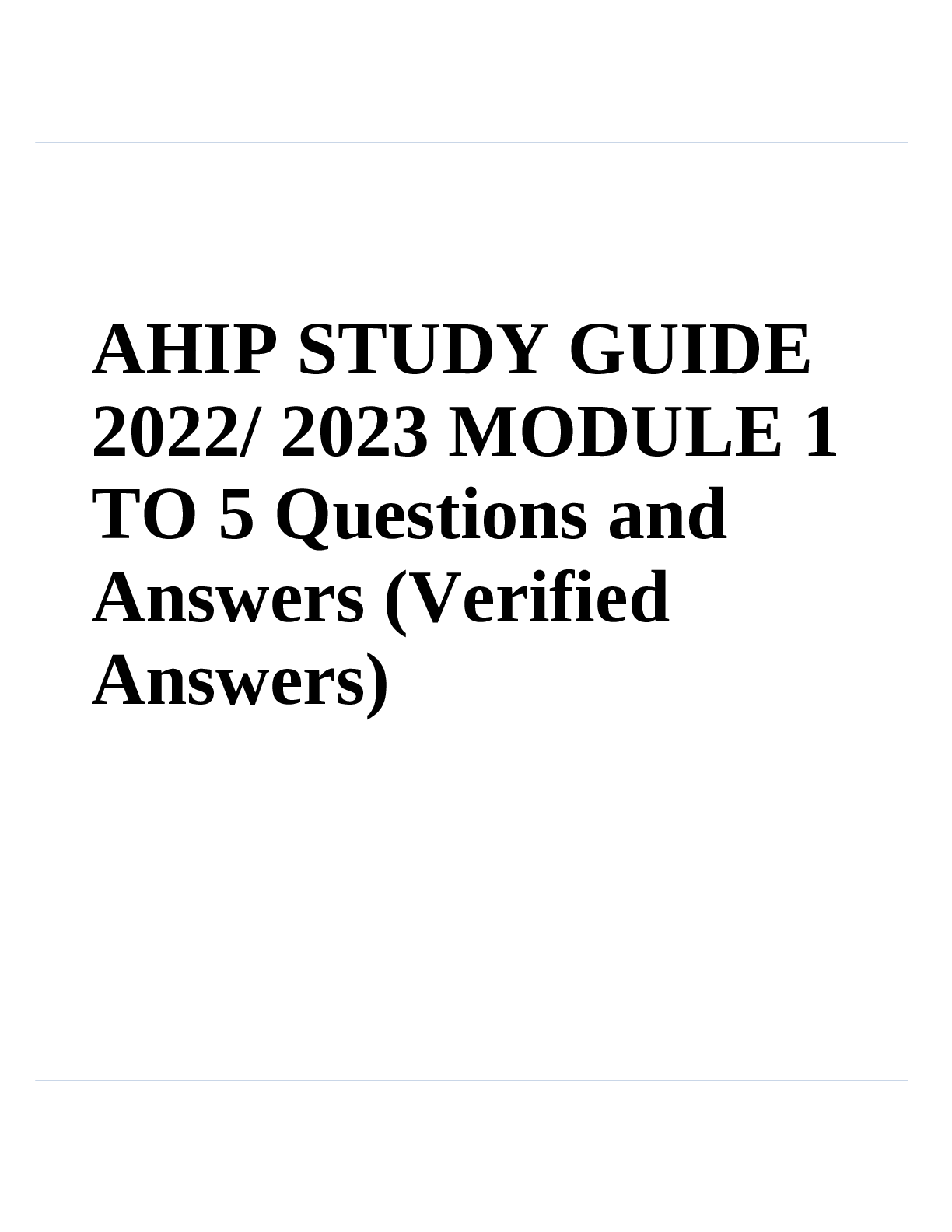
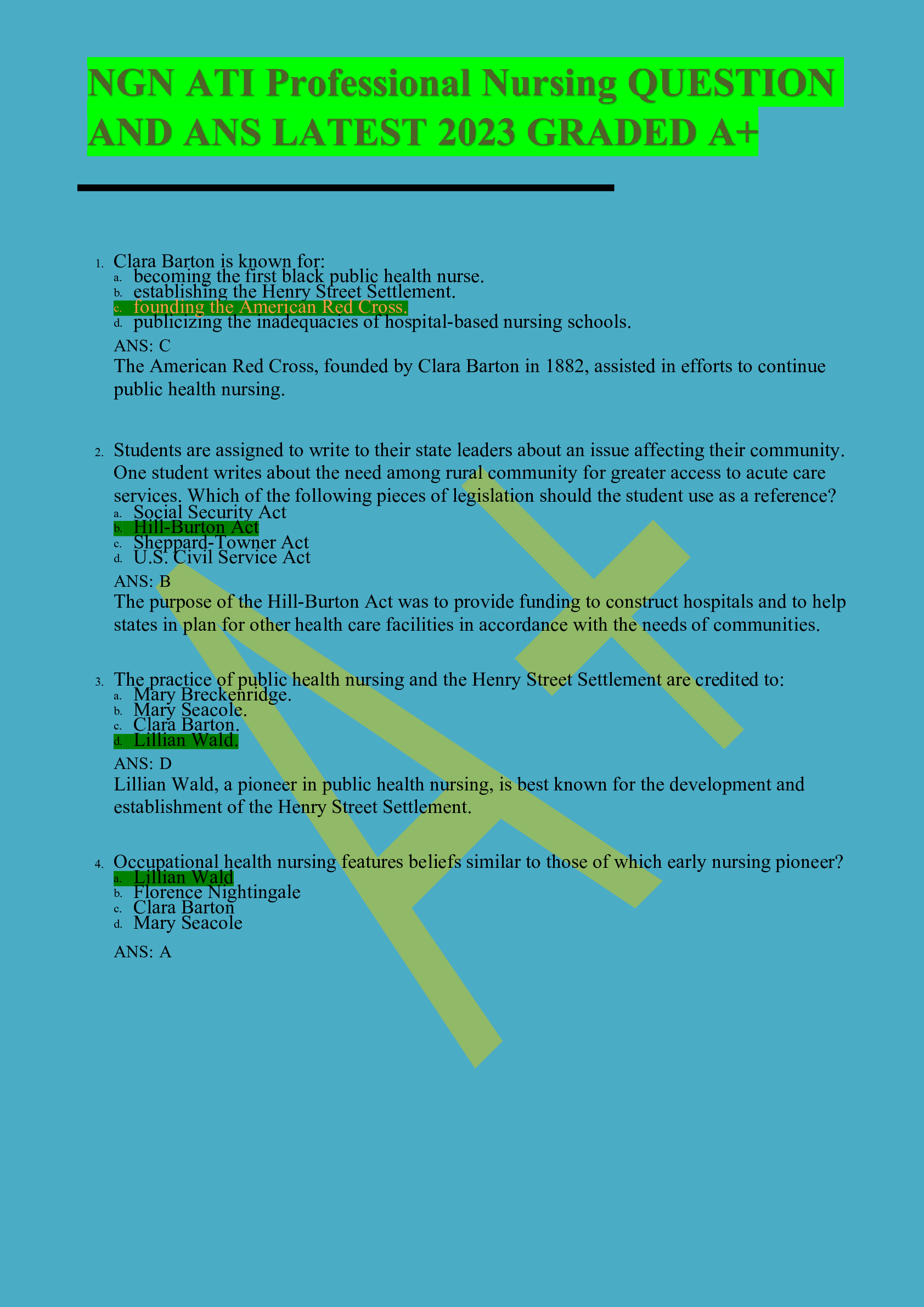

 A+ GRADED.png)

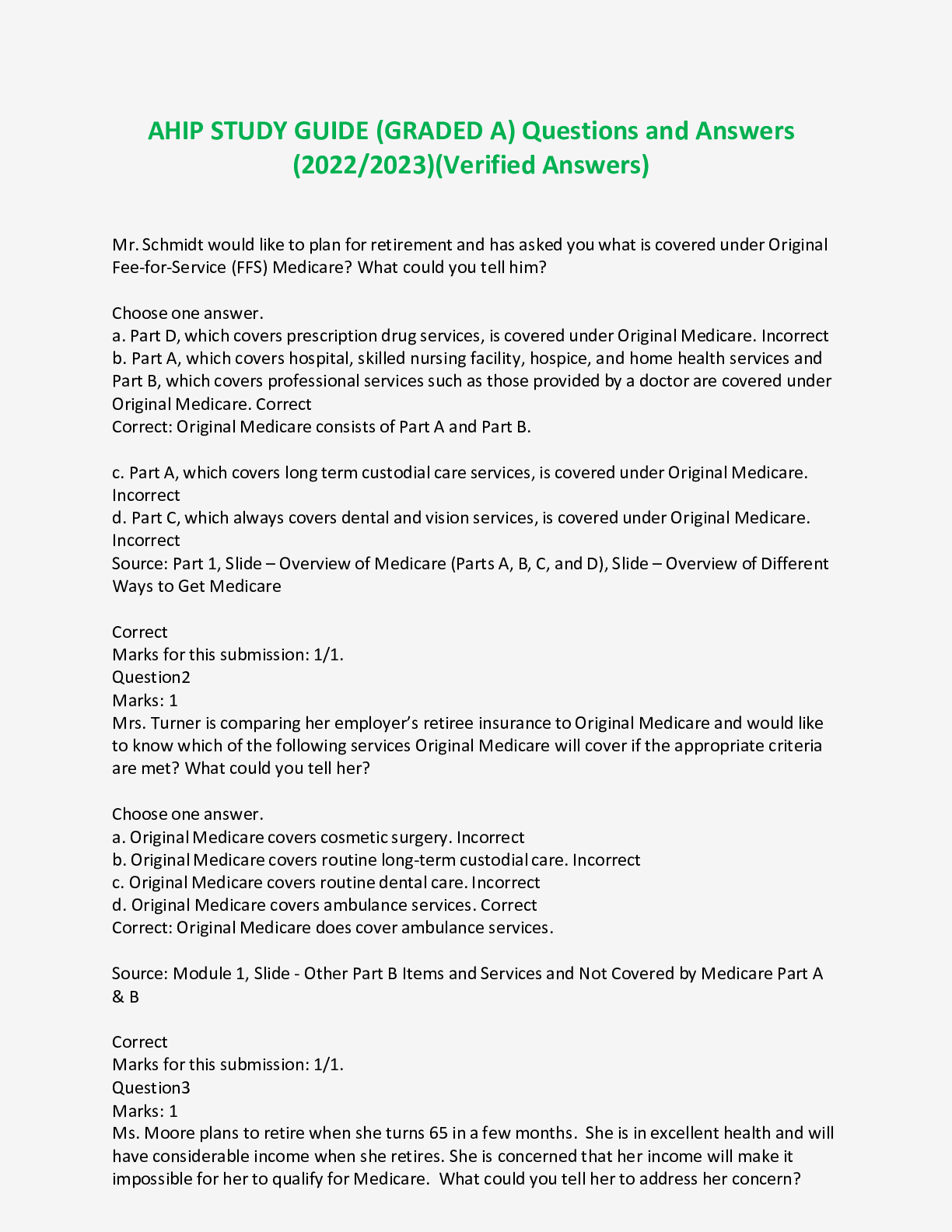
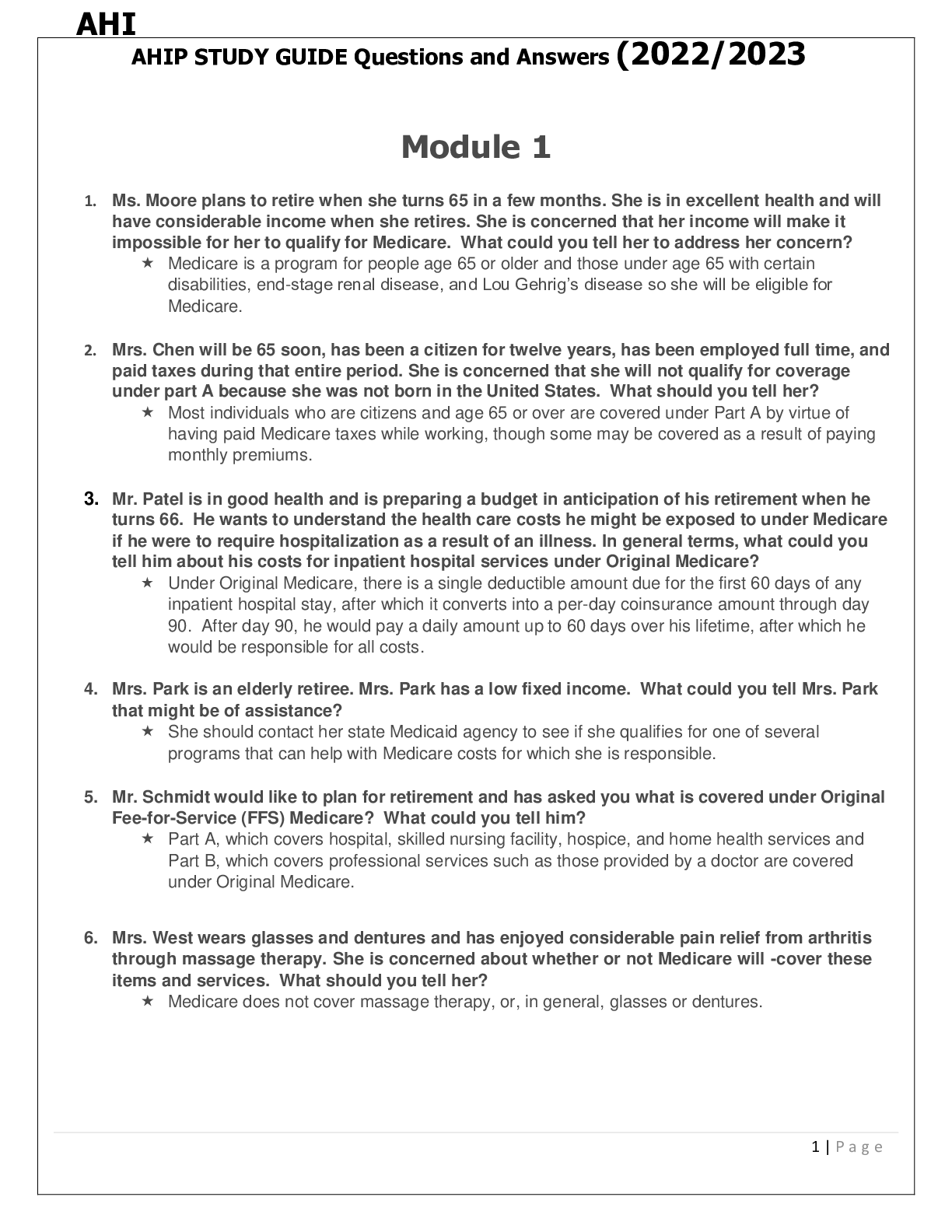
 (2)ww.png)
